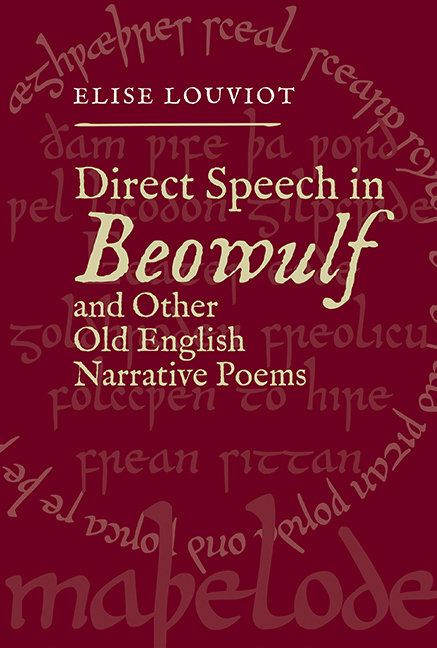Book contents
- Frontmatter
- Contents
- List of Figures
- Acknowledgements
- Introduction
- 1 The Form of Direct Speech
- 2 The Content and Context of Direct Speech
- 3 A Lack of Subjectivity?
- 4 Archetypal Subjectivity
- 5 A Problem with Voices
- 6 A Problem with Point of View
- 7 Impossible Irony
- Conclusion
- Bibliography
- Index
- Anglo-Saxon Studies
6 - A Problem with Point of View
Published online by Cambridge University Press: 05 June 2016
- Frontmatter
- Contents
- List of Figures
- Acknowledgements
- Introduction
- 1 The Form of Direct Speech
- 2 The Content and Context of Direct Speech
- 3 A Lack of Subjectivity?
- 4 Archetypal Subjectivity
- 5 A Problem with Voices
- 6 A Problem with Point of View
- 7 Impossible Irony
- Conclusion
- Bibliography
- Index
- Anglo-Saxon Studies
Summary
Voice and point of view are very closely connected. A textual ‘voice’ is given identity because its form – i.e. its style – is both distinctive and consistent, but also because it conveys a point of view that is itself distinctive and consistent. As such it is not surprising that point of view in Old English poetry presents many of the problems already noticed for voices. Though the two issues are similar and interconnected, it is useful, for the sake of clarity and precision, to examine them separately. Even more than the trouble with voices, the trouble with point of view in Old English poetry has far-reaching consequences for our understanding of the corpus.
Readers of modern and postmodern texts tend to judge characters not so much based on what the narrator says about them – we are now used to the idea that narrators are not always to be trusted – but based on what the characters do and even more on what they say. Undeniably, in such texts, implicit characterisation is both a very subtle and very powerful tool. When it comes to Old English poetry, however, opinions are somewhat divided: as mentioned in the introduction to this book, several critics have argued that Direct Speech in Old English poetry does not serve characterisation, but others have rejected that notion, in part because they felt it implied some sort of deficiency on the part of the Old English corpus.
This chapter aims to prove that Old English poetic speeches cannot allow implicit characterisation of the type expected by present-day readers and to explain why by pointing out the crucial differences between the handling of point of view in Old English narrative poetry and in (post)modern literature.
The theoretical study of point of view in narratives is closely linked to the rise of the realistic novel in the nineteenth century. One of the first writers to offer an in-depth reflection on the issue is in fact a novelist himself – Henry James.
- Type
- Chapter
- Information
- Direct Speech in Beowulf and Other Old English Narrative Poems , pp. 197 - 222Publisher: Boydell & BrewerPrint publication year: 2016



